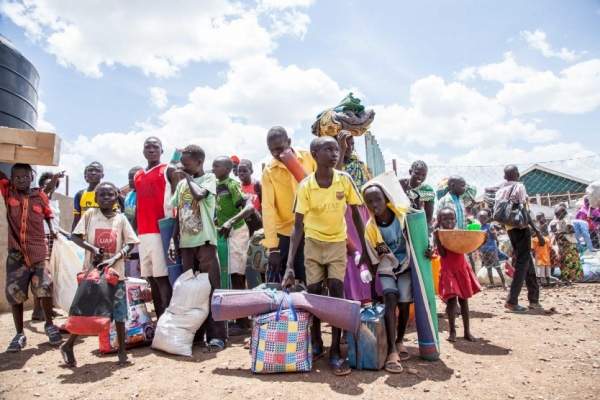The lack of political action or media coverage does not translate into the non-existence of a conflict or displacement crisis. The Norwegian Refugee Council (NRC) each year makes sure to draw the attention of the public on a short list of states affected by internal unrest or whose civilian population has been forced to flee to other regions (internal displacement) or neighbouring countries, which have been disregarded by the international community the preceding year. Among the motives of the neglect are the lack of geopolitical interests in the affected areas or the willingness to contribute to find a compromise between the warring parties, as well as the failing to identify with the victims.
The list of countries has been compiled according to three criteria, namely, lack of political will, lack of media attention and lack of economic support. The first is defined as the political willingness of the parties to protect civilian rights and engage in peace negotiation and the determination of the international community to intervene in order to find a political solution. The term “media attention”, instead, refers to the international media coverage measured by data collected by the monitoring company Meltwater. Finally, the lack of economic support was measured by the response to United Nation (UN) and its humanitarian partners’ appeals.
Cameroon is the first country to be featured in the report with three different parallel conflicts within its borders. According to the NRC, the clash with the Boko Haram terrorist group has forced half a million civilians to flee in the Far North, whereas the political crisis in the North-West and South-West regions has aggravated the humanitarian crisis. Since its beginning, 700,000 people have been internally displaced and refugees who have sought protection in Nigeria have reached the record number of 52,000. The lack of media attention has been mainly due to the arbitrary detention and prosecution of journalists conducted in the affected areas, as well as the difficulty in reaching the regions of conflict. To aggravate the situation, the humanitarian appeal funded has been insufficient, covering only the 43% of the necessary funding. Cameroon has maintained the position of the previous year in the ranking, underlining the severity of the international neglect.
The Democratic Republic of Congo is host to the second most neglected displacement crisis with the highest number of newly displaced people of any country in Africa and the second world’s biggest internal displacement after Syria, according to the Norwegian Refugee Council. It is currently being affected by the second biggest hunger crisis, after Yemen in 2019. The sufferings of the country worsened with an Ebola outbreak and flooding in 2019, to which the international community has responded offering less than half of the funding required (37%), one of the lowest funded appeals.
Burkina Faso ranks as the third country in the list, making its first appearance with the fastest growing displacement crisis in 2019. Despite the internal unrest, the high hunger levels, which leave more than a million people in need, the international community has responded by offering just half of the funding needed to alleviate the crisis.
The report also offers an insight on the internal situation of Burundi, where on average 500 to 1000 people each month leave for security reasons or due to the economic crisis. Venezuela with 5000 nationals fleeing each day in 2019 is the only South American country on the list. Additionally, the ranking features Mali, where the internally displaced people have reached the impressive number of 208,000 in 2019 (in contrast to the 120,000 of 2018), South Sudan, where seven million people are currently unable to feed themselves and 900,000 have been affected by floods, and Nigeria, whose security and humanitarian crises are expected to worsen in 2020. The last two positions are occupied by the Central African Republic, which hosted one of the worst conflicts in the world in 2019 in terms of number of civilian affected, and Niger, whose food insecurity has impacted the lives of 1,6 million people.
The Norwegian Refugee Council addresses its recommendations to five different subjects, namely, politicians and the UN Security Council, donors, journalists and editors, humanitarian organisations and, finally, the public. The NRC recommends the international community to focus on assisting countries basing their efforts on the severity of the crisis rather than the geopolitical interests in the area. Furthermore, donors should increase the flexibility of their funding in line with Grand Bargain, an agreement launched in 2016 during the World Humanitarian Summit (WHS), especially in the risk management, as well as increase their cooperation with organisations operating on the ground to provide a quick response. The NCR also recommends not to let COVID-19 take precedent in the funding, as it is set to receive most of the available funds.
To know more, please read:
https://reliefweb.int/sites/reliefweb.int/files/resources/1260983.pdf
https://www.internal-displacement.org/internal-displacement
https://interagencystandingcommittee.org/about-the-grand-bargain
https://www.worldbank.org/en/topic/fragilityconflictviolence/brief/forced-displacement-a-growing-global-crisis-faqs#:~:text=What%20is%20forced%20displacement%20and,persecution%20and%20human%20rights%20violations.&text=Displacement%20is%20also%20protracted%2C%20spanning%20years%20in%20many%20cases.
Author: Ludovica Di Gregorio







